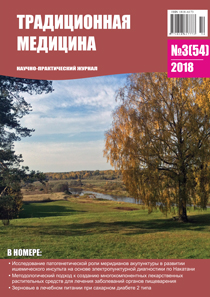Hepatoprotective activity of complex plant extract
Keywords:
complex plant extract, hepatoprotective activity, tetrachlormethane hepatitAbstract
The article presents the results of the study of the hepatoprotective activity of a complex plant extract obtained from the following types of raw plants: roots and rhizomes of elecampane, common grass, roots of Ural licorice, hips, fruits of hawthorn, in conditions of a tetrachloromethane hepatitis model. It was established that a course of per os intake of extract in a 300 mg / kg dose for white non-linear rats with tetrachloromethane damage to the liver has a hepatoprotective effect, somewhat superior to the effect of the comparator drug Carsil. The results of the study showed that pharmacotherapy of toxic hepatitis with plant extract clearly decreases levels of enzyme activity in serum - markers of cytolysis syndrome, manifestations of cholestasis syndrome also significantly decrease in these conditions. The pharmacotherapeutic effect of the extract in case of damage to the organs of the hepatobiliary system is due to the presence in it of a complex of biologically active substances and, above all, compounds of a phenolic nature. The results of the research substantiate the expediency of using a plant extract containing biologically active substances of a phenolic nature in the complex treatment and prevention of liver diseases.
Downloads
Published
How to Cite
Issue
Section
License
Reproduction of any materials without the written permission of the publisher is prohibited.
The responsibility for the accuracy of the information contained in articles and advertisements are the authors and advertisers.


